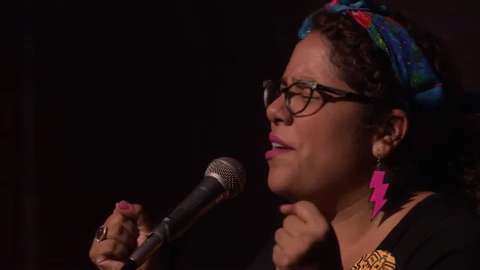
La Santa Cecilia: Straight Outta Olvera Street
Watch La Santa Cecilia's full performance on KCET-TV. Click here for future air dates.
It's been an epic year for Los Angeles based La Santa Cecilia, the quartet named after the patron saint of musicians. From winning a Grammy for their latest album "Treinta Dias" (Best Latin Rock Album), to touring with Los Lobos and collaborating with Elvis Costello, to being able to play in Latin America's biggest music festival as a complete band, to producing a heart wrenching music video for "El Hielo" (Ice) with acclaimed director Alex Rivera, the patron saint of music has indeed been kind to her devotees.
The band comprised of accordionist and requintero José "Pepe" Carlos, bassist Alex Bendaña, percussionist Miguel Ramírez, and lead vocalist Marisoul "La Marisoul" Hernández, is currently the most visible and critically acclaimed Latin group to emerge from the vibrant L.A. music scene that includes groups like Quetzal, Las Cafeteras and Chicano Batman, among many others. While the band mostly records in Spanish, evident in the group's sound are influences as diverse as cumbia, bossa nova, norteño, and classic rock with a Latin tinge. Case in point, their latest album features a Latinized cover of "Strawberry Fields Forever" and recent solo performances by La Marisoul have showcased a soulful cover of The Smiths' "Shoplifters of The World Unite." La Marisoul's Aretha Franklin-meets-Lola-Beltran vocals and the pan-Latino grooves of her band mates have established the band as a favorite amongst cultural critics and street-corner critics.
Indeed, La Santa Cecilia's ear has always been close to the streets given that they started their music careers in one of Los Angeles' most historic streets: Olvera street. Pepe explained: "Well, we grew up in Olvera Street here in Los Angeles, California, and we grew up playing, busking out on the streets on the weekends. That was our pastime. And we would play every weekend and we would sing boleros, rancheras, traditional Latin American huapangos or anything that was related to Latin America, and that was our pastime, that was our home!" Marisoul recalled meeting Pepe and his brother after her parents encouraged her to go sing at Olvera Street every weekend. "They'd say, go sing at Placita and busk and that's how you're gonna make some kind of living and stuff. And that's how I met [Pepe] on the weekends, and we were always there every weekend! We were there from 11 am to 6 pm singing. He and his brothers would sing on one side of the street, and I would sing with some other musicians on the other. And we would just kind of say like, 'Hey, what's up,'" said Marisoul.
Not only was the Olvera Street Plaza where the core of La Santa Cecilia met it was also a musical education in more ways than one. "Yeah, the streets were like our school, or at least my musical school. I didn't take any musical lessons or have a career in music from school, but I did learn busking and singing loud and talking to the crowd and to give thanks to La Santa Cecilia for the work that I received," said Marisoul. The band credits working musicians at Olvera Street for showing them how to present themselves, respond to on the spot requests, and above all else hustle for work. La Marisoul and Pepe worked weddings and events as part of a trio, sang the news on a local radio station, busked, and in the process experimented with what sounds move a crowd. Coming from the Latino community and learning their craft from hardworking musicians also means they remain rooted in the struggles of that experience.
The band's most political statement has come in the form of the song and accompanying music video for "El Hielo" (Ice) which uses a melancholic bolero groove usually reserved for sagas of unrequited love to tell the heartbreaking tribulations of the estimated 11 million undocumented immigrants in the U.S. The band, like many Latino families -- and many immigrant families in general -- are of mixed legal status. The video openly acknowledges Pepe Carlos' undocumented status. However, thanks to the Deferred Action for Childhood Arrival (DACA) executive order Pepe was recently granted a temporary work-permit that has allowed him to travel abroad without fear of never returning.
"The need to do a song like "El Hielo" comes from our own experiences, from seeing a lot of our friends, even our bandmates here not having the proper documentation to travel, said Marisoul. Through "El Hielo" that band attempts to humanize a maligned group of people by focusing on the stories and feelings of being in such a position. In their acceptance speech for their Grammy win the group dedicated "the award to the more than 11 million undocumented people because we want people to just remember that there are people out there who need it, that are working really hard behind the scenes; in the kitchens, domestic workers, everywhere you look. The country is being moved still by immigrants," expressed Marisoul.
They have faith their music will reach hearts and minds.
Although the group is named after a religious figure the band insists their faith is grounded in the higher power of music and a belief in their bandmates musical abilities. "It wasn't like a religious thing, it was more so like a faith that we all had and what we can accomplish with music, and what we could accomplish and believe in ourselves and our dreams," said Miguel about the band's name.
Extending the religious metaphor, La Santa Cecilia reached a moment where they had to test their faith in each other and their music. "I mean, we all quit our jobs!" said Alex recalling the decision to make music full-time. "We hit some really hard times where we didn't have anything. We didn't think about that when we started, just saying, "You wanna go full-time La Santa Cecilia?" And when we did that, it was hard. It was really hard. And luckily everyone was able to stick it out, but I think the music kind of was our teacher. We were learning as we were going; experimenting with mixing this and mixing that, and what happens when you mix this with that, and what if we take this from here?" added Miguel.
With cross-country touring and invitations to festivals like Mexico's "Vive Latino" the band acknowledges they are in a privileged position now even as they continue in the grind of making music full-time. Whatever the accomplishments they remain focused on the work that lies ahead.
In the Mexican Catholic tradition of a "manda" the faithful make a vow or offering to a saint or religious figure with the fulfillment of a miracle, cure or blessing. La Santa Cecilia's blessed manda or offering is to sing the polyrhythmic complexity of their music and culture in an earnest and faithful way.
"Yeah we'll probably be paying dues forever, but we're still working. Still working," said Miguel











